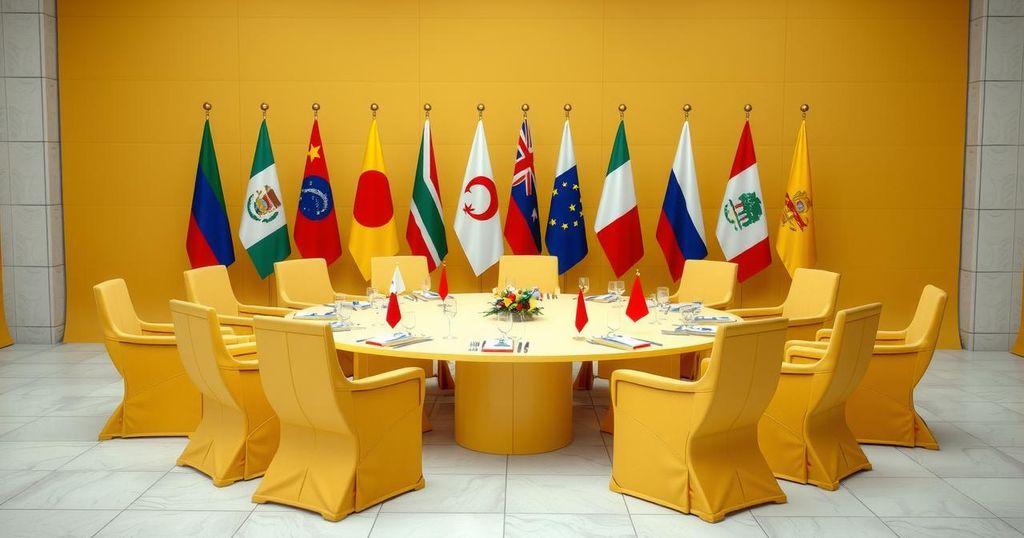The US-Ukraine peace talks in Saudi Arabia aim to strengthen US support for Ukraine amidst ongoing conflict with Russia. President Trump expresses optimism for progress despite expressing concerns about Ukraine’s survival. Key proposals may include a partial ceasefire, but significant geopolitical challenges remain, including demands for Ukrainian concessions and the fallout from recent military actions.
Saudi Arabia is set to host peace talks between the United States and Ukraine, following a recent contentious meeting at the White House attended by President Donald Trump, Ukrainian President Volodymyr Zelensky, and JD Vance. The talks, commencing on Tuesday, occur after discussions involving a Russian delegation and Mr. Trump’s team nearly a month prior. President Trump expressed optimism about achieving substantial progress during these negotiations, though he also voiced uncertainty regarding Ukraine’s ability to withstand the ongoing invasion by Russia.
The fundamental aim for Ukraine, as well as for Europe, is to re-establish robust US support. Prime Minister Keir Starmer has dispatched his national security advisor, Jonathan Powell, to Kyiv to advise on the expected discussions. While Saudi Arabia may appear an unconventional venue, Crown Prince Mohammed bin Salman’s government is positioning itself as a pivotal mediator in peace talks between Kyiv and Moscow. The negotiations will take place in Jeddah, a significant port city on the Red Sea.
As the talks proceed, Ukraine faces significant challenges, particularly following a recent counterattack by Russian forces near the Kursk border region, which could undermine Ukraine’s negotiation position. President Zelensky arrived in Saudi Arabia after previously visiting the United Arab Emirates, which had also been considered for hosting peace discussions. He remarked on the importance of collaborating with partners who share the desire for peace, emphasizing extensive efforts underway to enhance security.
During the previous White House meeting, President Trump criticized Zelensky’s unwillingness to pursue peace negotiations assertively, claiming, “You’re gambling with World War III,” highlighting the gravity of the situation. Despite the absence of a formal agreement from the meeting, Zelensky expressed hope that revitalizing military support from the US would be prioritized, particularly for a deal involving access to Ukraine’s rare earth minerals.
President Zelensky will be accompanied in Saudi Arabia by key advisors, including his chief of staff and defense minister. The US delegation will be led by Secretary of State Marco Rubio, who will meet with the Crown Prince. Rubio has emphasized Trump’s commitment to achieving a swift resolution to the conflict, asserting that all parties must act to secure lasting peace.
Ukraine is expected to propose a partial ceasefire involving air and sea operations with Russia, an idea Zelensky has publicly endorsed, particularly after a recent missile attack resulted in civilian casualties. This proposal aims to encourage the US to resume comprehensive military and intelligence support, which remains crucial for Ukraine’s defense efforts.
Conversely, US officials suggest that President Trump desires concessions from Ukraine, including territorial compromises and potential moves towards elections in the country, despite the current state of martial law, preventing them from taking place. Opposition leaders in Ukraine have voiced strong resistance to any electoral processes that might legitimize Russian territorial claims. Zelensky himself has indicated a willingness to prioritize Ukrainian NATO membership over his leadership role, a prospect that Trump has dismissed.
In summary, the forthcoming US-Ukraine peace talks in Saudi Arabia are positioned against a backdrop of complex negotiations and pressing geopolitical challenges. The emphasis will be on restoring US support for Ukraine while navigating the intricacies of potential territorial concessions and the overall pursuit of security. Both nations face a critical juncture as they seek a path towards a sustainable peace amidst ongoing hostilities with Russia.
Original Source: www.independent.co.uk




